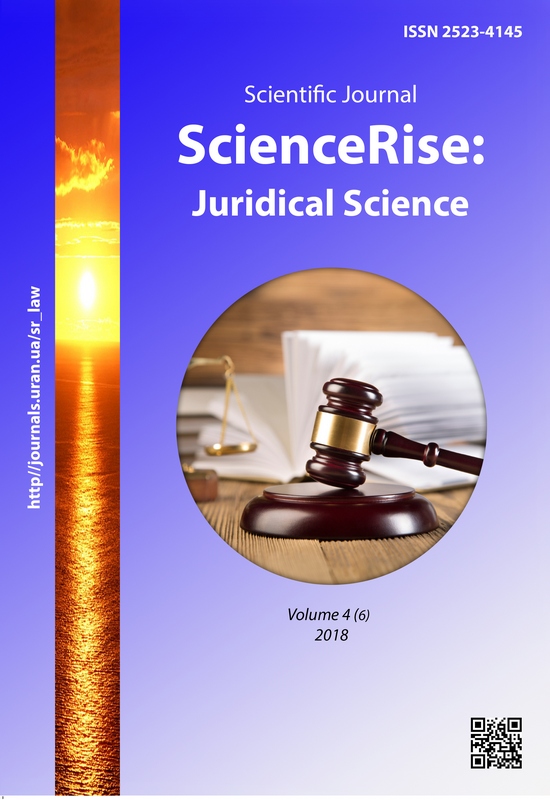Legal subjectity in private-public law: categorical-conceptual cognition in the context of general theory of law
DOI:
https://doi.org/10.15587/2523-4153.2018.150348Keywords:
private-public law, subjects of private-public law, category «legal subjectivity», notion «private-public legal subjectivity»Abstract
The private-public sphere in law is constituted through the essential commonality of subjects and methods of those sectors that form it. The conventionally common subject of private-public sectors of law are social relations arising between natural persons, legal entities and various associations of the first and/or second in the process of realization by these subjects of their personal interests at the expense of public resources and subject to public interests. The methods of private-public sectors of law are characterized by a combination of imperative and dispositive elements, when the latter are playing a decisive role. In addition, the sectoral legal norms of private-public origin are consolidated into a specific integrity by a special system of generic principles.
The essential features, generally inherent in nature of private-public legal subjectivity, include, firstly, its integrity and structural completeness (which means the constant presence at the disposal of the subject of law the appropriate scope of private-public legal capacity, delictual capacity and active capacity), secondly, internal systemic concordance (which does not provide for the domination of separate structural element in the private-public legal subjectivity), thirdly, the functioning of this legal phenomenon mainly in the format of special legal subjectivity and, fourthly, diversity of its species (which allocated by functional content).
In the doctrines of private-public sectors of law the application of the notions «legal capacity» and «active capacity» to the characteristic of the relevant sectoral phenomena of legal subjectivity causes a critical attitude. Instead, on the basis of concrete provisions of sectoral legislation the scientists propose to use the notion of the «competence» which has more large volume of content and publicly-legal origin. The notion of «delictual capacity», despite the essentiality of its methodological potential, in the doctrines of the private-public law has not received proper admission and research.
Private-public legal subjectivity – it’s a specific kind of legal subjectivity, which is inherent to natural persons, legal entities and their various partially personalized associations, which within the current legal order and at the expense of public resources realize their personal interests
References
- Bernatskiy, G. G. (2017). Predmety poznaniya yuridicheskoy nauki. Publіchne pravo, 3, 56–64.
- Savchenko, S. V. (2013). Spivvidnoshennia pryvatnykh ta publichnykh interesiv: dosvid Ukrainy. Forum prava, 3, 520–528.
- Hetmantseva, N. D. (2018). Stanovlennia i rozvytok trudovoho prava yak proiav yednosti pryvatnykh i publichnykh zasad. Yurydychna Ukraina, 1-2, 66–73.
- Hrudnytska, S. (2008). Hospodarska pravosubiektnist: problemy vyznachennia sutnosti ta poniattia. Pidpryiemnytstvo, hospodarstvo i pravo, 9, 65–67.
- Hospodarskyi kodeks Ukrainy vid 16.01.2003. Hlava 27 «Administratyvno-hospodarski sanktsii» (2003). Available at: http://zakon.rada.gov.ua/laws/show/436-15
- Kodeks Ukrainy pro administratyvni pravoporushennia vid 07.12.1984. Hlavy 5, 8, 12, 13 (1984). Available at: http://zakon.rada.gov.ua/laws/show/80731-10
- Kryminalnyi kodeks Ukrainy vid 05.04.2001. Rozdil VII «Zlochyny u sferi hospodarskoi diialnosti» (2001). Available at: http://zakon.rada.gov.ua/laws/show/2341-14
- Kodeks zakoniv pro pratsiu Ukrainy No. 322-08. 10.12.1971. Stattia 187 (1971). Available at: http://zakon.rada.gov.ua/laws/show/322-08
- Venediktov, S. V. (2012). Pravove rehuliuvannia trudovykh vidnosyn: vitchyznianyi ta zarubizhnyi dosvid. Kyiv: Alerta, 368.
- Tsyvilnyi kodeks Ukrainy No. 435-IV. 16.01.2003. Stattia 50 (2003). URL: http://zakon.rada.gov.ua/laws/show/435-15
- Bratus', S. N. (1947). Yuridicheskie litsa v sovetskom grazhdanskom prave. Moscow: Yurizdat, 363.
- Grazhdanskiy kodeks Frantsii (Kodeks Napoleona) (2016). Kyiv: Alerta, 1156.
- Hospodarskyi kodeks Ukrainy No. 436-IV. 16.01.2003. Chastyna 1 statti 43 (2003). Available at: http://zakon.rada.gov.ua/laws/show/436-15
- Pro finansovi posluhy ta derzhavne rehuliuvannia rynkiv finansovykh posluh (2001). Zakon Ukrainy No. 2664-III. 12.07.2001. Stattia 5. Available at: http://zakon.rada.gov.ua/laws/show/2664-14
- Pro pryrodni monopolii (2000). Zakon Ukrainy No. 1682-III. 20.04.2000. Stattia 10. Available at: http://zakon.rada.gov.ua/laws/show/1682-14
- Hospodarskyi kodeks Ukrainy No. 2664-III. 16.01.2003. Chastyna 2 ta chastyna 3 Statti 43 (2003). Available at: http://zakon.rada.gov.ua/laws/show/2664-14
- Hospodarskyi kodeks Ukrainy No. 436-IV. 16.01.2003. Stattia 2. Available at: http://zakon.rada.gov.ua/laws/show/436-15
- Shcherbyna, V. S. (2008). Subiekty hospodarskoho prava. Kyiv: Yurinkom Inter, 264.
- Hetmantseva, N. D. (2017). Trudova pravosubiektnist yak skladna yurydychna yurydychna konstruktsiia. Sotsialne pravo, 1, 83–92.
- Pundor, Yu. O. (2013). Pro vyznachennia zmistu katehorii «pravosubiektnist» u teorii prava ta haluzevykh teoriiakh tsyvilnoho y hospodarskoho prava (porivnialno-pravovyi aspekt). Chasopys Kyivskoho universytetu prava, 1, 60–63.
- Hospodarskyi kodeks Ukrainy № 436-IV. 16.01.2009. Stattia 55 (2009). Available at: http://zakon.rada.gov.ua/laws/show/436-15
- Tsyvilnyi kodeks Ukrainy No. 435-IV. 16.01.2003. Stattia 77 (2003). Available at: http://zakon.rada.gov.ua/laws/show/435-15
- Pro derzhavno-pryvatne partnerstvo (2010). Zakon Ukrainy No. 2404-VI. 01.07.2010. Available at: http://zakon.rada.gov.ua/laws/show/2404-17
Downloads
Published
How to Cite
Issue
Section
License
Copyright (c) 2018 Volodymyr Sichevliuk

This work is licensed under a Creative Commons Attribution 4.0 International License.
Our journal abides by the Creative Commons CC BY copyright rights and permissions for open access journals.
Authors, who are published in this journal, agree to the following conditions:
1. The authors reserve the right to authorship of the work and pass the first publication right of this work to the journal under the terms of a Creative Commons CC BY, which allows others to freely distribute the published research with the obligatory reference to the authors of the original work and the first publication of the work in this journal.
2. The authors have the right to conclude separate supplement agreements that relate to non-exclusive work distribution in the form in which it has been published by the journal (for example, to upload the work to the online storage of the journal or publish it as part of a monograph), provided that the reference to the first publication of the work in this journal is included.








